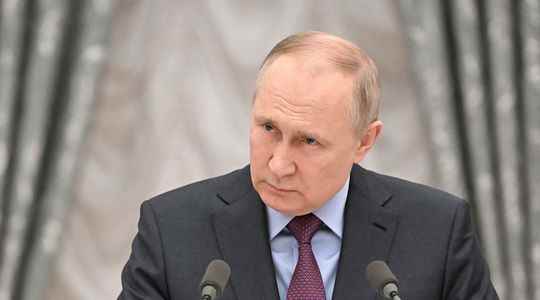The recognition of the separatist states of Donetsk (DNR) and Luhansk (LNR), in eastern Ukraine, on Monday, by Vladimir Putin, was feared by the Western world. The news greatly increases the likelihood of a Russian occupation of the Donbass region (follow our live). And perhaps opens the way to worse: a total invasion of Ukraine, considered Monday by the leader of the Kremlin, during a particularly brutal intervention, of “American colony”. Europe as well as the United States are thus working on economic sanctions, in order to slow down Russia in its movements. Which ones?
- Suspension of the Nord Stream II gas pipeline by Germany
Unsurprisingly, Germany has activated one of its cards, the suspension of the Nord Stream II gas pipeline, a flagship project for Berlin as for Vladimir Putin long carried out despite criticism. The halt, perhaps definitive, to this pharaonic project was given by the German Chancellor Olaf Scholz. The gas pipeline, whose construction has been completed since last autumn, was not in service anyway due to a legal blockage by the German energy regulator: it does not yet comply with European and German legislation in the sector. .
What impact will this have on Russia? Former Russian President Dmitry Medvedev quipped: “Welcome to a new world, where Europeans will soon pay 2000 euros for 1000 M3 of gas”, a potentially colossal sum for Germany, which in 2020 alone imported 56 .3 billion m3 of Russian gas, or 55% of its gas needs. Europe imports overall 40% of its gas needs from Russia.
- Banks targeted by the EU and the British
The Europeans and the British, for their part, focused their first blows on Russian finance. Three oligarchs close to the Kremlin and five banks are targeted by British sanctions, including Rossiïa and Promsviazbank. Banks however “relatively minor”, notes Olivier Dorgans, also recalling that many Russian capital outside the country has already been repatriated as a preventive measure.
Europe remains cautious on this point. The French banking group Societe Generale, through its subsidiary Rosbank, the Italian Unicredit and the Austrian Raiffeisen could be affected by a potential escalation of tensions. Especially if Washington decides to draw the weapon of the ban on transactions in dollars or if Russia is excluded from the international Swift system, essential for international banking exchanges.
- Asset freeze and upcoming visa bans
The Twenty-Seven EU Member States also approved on Tuesday a “sanctions package” “unanimously” against Russia, which will “hurt it very badly”, after its decision to recognize the separatist territories in the eastern Ukraine, according to EU foreign policy chief Josep Borrell.
On the menu: asset freeze and visa ban against the 351 Russian Duma deputies who approved the recognition of the independence of the separatist territories. “Sanctions do not have miraculous effects. But sanctions hurt economically and hurt the people affected,” argued Josep Borrell, stressing that EU member countries had decided to keep “other ammunition (…) to respond to new actions on the part of Russia”, because “the story is not over”.
Finally, the EU must soon detail the list of institutions affected by asset freezes due to the financing of Russian military activities. Other avenues are also on the table, such as the impossibility for the Russian state to access European capital markets to refinance its debt. A more painful action for Russia, which would weigh on the value of the rouble, and by extension the purchasing power of Russian consumers for imported products.
- Expected US announcements
What to expect from the United States? Via an executive order, the president already banned Monday evening any new investment, exchange, or financing by American persons to, from or within these pro-Russian regions. But these regions already have extremely limited relations with the United States. Further announcements are expected on Tuesday evening. Because the United States takes the threat very seriously.
“We believe this is, yes, the start of an invasion,” senior White House official Jonathan Finer told CNN. The day before, the presidency had been careful not to take this step, speaking rather of “flagrant violation” of Moscow’s international commitments. This new posture will be accompanied on Tuesday by new measures, promised the American executive.
